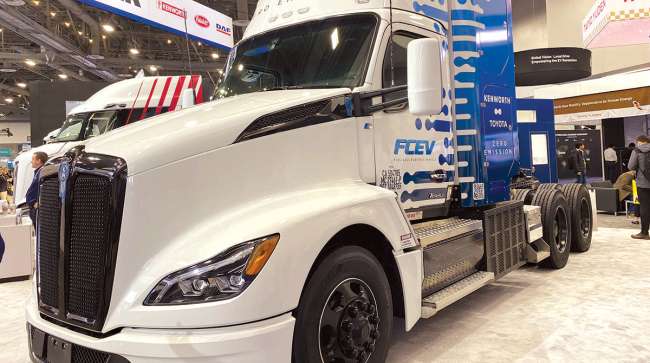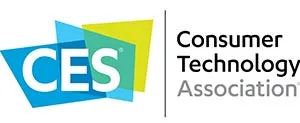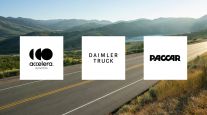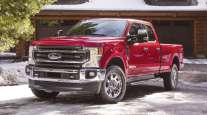Staff Reporter
Battery Plant Location Decision Nears for Paccar, Partners

[Stay on top of transportation news: Get TTNews in your inbox.]
LAS VEGAS — A trio of equipment makers partnering to build a factory to produce lithium-iron phosphate batteries are nearing a decision on a location for the facility, an executive from one of the companies said.
The companies, Paccar Inc., Daimler Truck Holding and Cummins Inc., in September announced a joint venture under which they’d build a 21-gigawatt hour factory that carries an anticipated price tag of $2 billion to $3 billion. During CES 2024, Carl Hergart, Paccar senior director of global powertrain planning and agency, said many factors are being considered in the selection process, including tax incentives and supply chain logistics. However, he stressed that the end result will bring forth manufacturing capacity that none of the partners could have achieved individually.
“The joint venture will establish a robust, secure battery supply chain that meets the needs of the commercial vehicle industry,” Hergart said. “That’s something no one [original equipment manufacturer] could achieve by themselves.”
Paccar is the parent of U.S.-based truck makers Kenworth and Peterbilt.

Federal approval for the partnership is expected this year. Since Germany-based Daimler and its China-based battery technology partner Eve Energy Co. are headquartered outside the U.S., the partnership requires approval from the U.S. Treasury Department Committee on Foreign Investment in the United States. However, the partners have signed binding agreements and are aiming to finalize the agreement by year’s end, Hergart told reporters.
While Bellevue, Wash.-based Paccar has LFP battery suppliers, it aims to have its own supply by 2027, said Hergart. He noted that LFP is ideal for commercial applications because of its durability, greater life cycle and lower costs compared with nickel, manganese and cobalt batteries.
“We want to have an incredibly durable, abuse-tolerant battery that goes for the life of the truck and that the customer can rely on,” Paccar Chief Technology Officer John Rich said during a media briefing. “You have to ask yourself [how long] will that battery last.
“So chemistry has become very important.”
Just as important, Rich added, is building batteries specifically for trucks.
“There’s a lot of people making car batteries. We don’t make cars. We don’t make car parts,” he said. “We wanted a differentiated product that was unique to trucks. That was very, very important to us.”

Hergart
Hergart said Paccar hopes the initiative will make it easier for trucking companies to transition away from diesel-powered trucks.
“It is hard to imagine a more exciting time in our industry,” he said. “As stewards of sustainability, we are steering the trucking industry to a zero-emissions future.”
For that future, supply security was paramount, said Rich. “We had to know that we had access to the quantities we needed and wanted — of batteries — to enable our production plans and our changeover plans,” he said.
In-house manufacturing also helps Paccar control costs for itself and its customers, Rich said. “We’re asking a lot of customers right now [about] the current price point of electric vehicles,” he said. “We have to get [the cost] down to the point where they can substitute for diesel in the right use case, where you have the technology use case.”

Rich
Rich added, “We need to get to the point where there’s an economic driver to be in [battery-electric] or it’s just not going to work. We’re not going to live on incentives forever.”
Plus, Paccar realizes battery-electric isn’t the only option fleets will have, Rich added. To that end, the company also is developing hydrogen fuel cell electric powertrains and is exploring hydrogen-fueled internal combustion engines.
“You have to play a broad field until the winners emerge,” he said. “I don’t pretend to be able to tell you what the nominative technology is going to be. It’s a fool’s errand to think you know the answer and throw a lot of capital after a single solution at this point in the transition.”
Hydrogen, for one, offers options, Rich added.
“There’s lots of ways to fuel a truck with hydrogen, whether it is combustion or a fuel cell,” he said. “Our strategy is to participate in a broad array of technologies efficiently, through partners where appropriate, until clear winners emerge.”
Want more news? Listen to today's daily briefing above or go here for more info
At the show, the Kenworth T680 FCEV — developed in partnership with Toyota Motor Co. — was on display. Paccar has deposits in place for about 150 Kenworth and Peterbilt FCEVs, said Hergart. Plans to advance the partnership to commercial production were announced in May 2023 at the Advanced Clean Transportation Expo in Anaheim, Calif.
Kenworth Chief Engineer Joseph Adams told Transport Topics that pilot trucks will be built in 2024, with sample trucks reaching customers in 2025 and serial production and delivery to follow in late 2025 or early 2026.
As for hydrogen internal combustion engines, Hergart said they could be introduced in 2028, following the planned debut of 2027 federal updates to nitrogen oxide and particulate matter standards.




